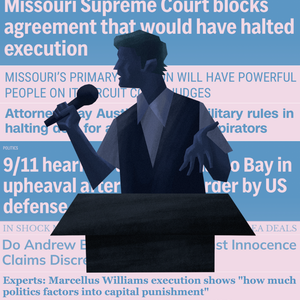
In an October 2010 interview on National Public Radio, then newly-retired Supreme Court Justice John Paul Stevens said he particularly regretted one vote during his 35 years on the high court — his 1976 vote to uphold the death penalty in Gregg v. Georgia. Stevens remarked, “I thought at the time … that if the universe of defendants eligible for the death penalty is sufficiently narrow so that you can be confident that the defendant really merits that severe punishment, that the death penalty was appropriate.” But, he added, over the years, “the Court constantly expanded the cases eligible for the death penalty, so that the underlying premise for my vote has disappeared, in a sense.” Justice Stevens also said that the court has made death penalty procedures more sympathetic to prosecutors: “I really think that the death penalty today is vastly different from the death penalty that we thought we were authorizing.”
The interview was conducted by NPR correspondent Nina Totenberg. She wrote more about Stevens’s views: “The court, he notes, has become more permissive in allowing prosecutors to object to seating jurors who have qualms about the death penalty. The result is that instead of getting a random sample of jurors, jury panels are more supportive of the death penalty. In addition, the court now allows the relatives of crime victims to testify during the penalty phase of a capital trial. These so-called victim impact statements were once ruled too incendiary to be permissible, but four years later, a more conservative court reversed the decision. All of this, says Justice Stevens, has changed the nature of the death penalty as he and the court envisioned it in the 1970s.”
(N. Totenberg, “Justice Stevens: An Open Mind On A Changed Court,” NPR, October 4, 2010). See U.S. Supreme Court. The vote upholding the death penalty in Gregg v. Georgia in 1976 was 7 – 2. Among those in the majority were Justices Blackmun and Powell, in addition to Justice Stevens. Since then, all three Justices have said they had changed their minds about the death penalty and no longer believed it was constitutional. If those Justices had voted differently in Gregg, the death penalty would probably have been ended by a 5 – 4 vote in 1976. It had already been struck down 5 – 4 in 1972 in Furman v. Georgia, and Gregg and the four other death penalty cases decided along with it in July 1976 were the test cases to see if the newly reinstated death penalty statutes were constitutional.
Arbitrariness
Nov 05, 2024

DPI Report Provides Valuable Context for 2024 Elections
United States Supreme Court
Oct 18, 2024

Professor Steve Vladeck on the Supreme Court’s Death Penalty Shift
Arbitrariness
Oct 04, 2024
